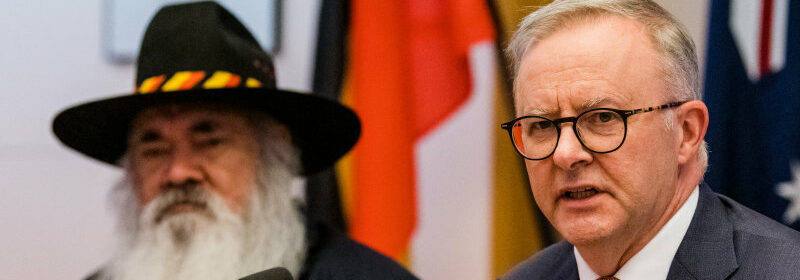Albanese strikes key peace deal on Voice

Prime Minister Anthony Albanese will secure a crucial deal on the wording of the Voice referendum, ending weeks of debate and avoiding a damaging split between Labor and the Indigenous leaders spearheading the push.
Albanese, Attorney-General Mark Dreyfus and Indigenous Australians minister Linda Burney met six Indigenous leaders – Marcia Langton, Pat Anderson, Thomas Mayo, Tony McAvoy, former minister Ken Wyatt and professor Megan Davis – in an hours-long meeting on Tuesday evening to thrash out the final wording for the constitutional change.
Prime Minister Anthony Albanese addresses the Indigenous referendum working group at a meeting in February. Credit:James Brickwood
The looming deal represents the second victory for the government in an important fortnight for the Voice after the Coalition agreed to pass a bill that sets up the rules for the referendum, including on how voters will be informed.
Three sources with direct knowledge of the negotiations, who all spoke anonymously because the talks are confidential, said the government and Indigenous leaders have agreed on a final set of words to be put to the Australian public in a referendum between October and December. If successful, these words will be written into the Constitution.
The government hopes the new words will help foster bipartisanship without weakening the Voice, which would have angered advocates for the new advisory body.
On Wednesday afternoon, Davis said that the referendum group was “close” to finalising its advice to the government. “So close to doing what grassroots communities across the country have asked for. So close to taking the next historic steps towards a successful yes vote,” she said.
Cabinet is expected to sign off on the wording at 9am on Thursday morning, with the prime minister to unveil the final wording soon after.
Ending the destabilising debate over wording will allow the Yes group to focus its attention on ramping up its campaign, which has been muted to date and sometimes drowned out by detractors from the left and right flanks of Indigenous politics.
Until the agreement was struck, there was a live prospect Albanese’s cabinet would overrule the Indigenous working group and insert seven words proposed by Attorney-General Mark Dreyfus two weeks ago.
Dreyfus’ proposed addition, first revealed in this masthead, was opposed by most Indigenous leaders and set up a potential clash with the Albanese cabinet seeking a pragmatic path forward.
But the new agreement struck this week has averted a dire situation in which the government rejected the wishes of Voice proponents, which could have split the Voice movement and derailed the referendum.
The tweak to the wording, which has not yet been revealed, is designed in part to win over support from conservatives who feared the proposed amendment could open the door to High Court challenges of parliamentary decisions if someone could argue that the Voice body was not properly consulted.
“The wording has changed a fair bit from Garma,” according to one source familiar with the Albanese meeting, who asked not to be named. “The essence of the words is there but it has been tweaked”.
The original wording, revealed ahead of Albanese’s speech at the Garma festival in Arnhem Land in July last year, read: “The parliament shall, subject to this Constitution, have power to make laws with respect to the composition, functions, powers and procedures of the Aboriginal and Torres Strait Islander Voice”.
Dreyfus’ seven word addition to the constitutional amendment – “and the legal effect of its representations” – was aimed at guarding against High Court challenges in the event that the government failed to consider the advice of the Voice, a possibility that has emerged as a key sticking point for some conservatives.
On Tuesday, Prime Minister Anthony Albanese stressed the importance of bipartisanship in a meeting of Labor MPs and highlighted the rate of failure for referendums, underscoring the government’s private concerns about the chance of succeeding. Polling shows a majority of Australians support the Voice, but the level of support has decreased and is not strong enough to guarantee victory.
Albanese told the Labor caucus it was important to “minimise scare campaigns” and cited three pieces of history to colleagues: that only 20 per cent of referendums proposed by Labor governments had succeeded, that no referendum had been approved in several decades, and none had won without bipartisan support.
While the Coalition will support the technical bill on referendum rules, it remains unclear what position the party will formally adopt. Three options are on the table: a free vote; formal support for the no vote; or allowing people to criticise formal support for a no vote.
Cut through the noise of federal politics with news, views and expert analysis from Jacqueline Maley. Subscribers can sign up to our weekly Inside Politics newsletter here.
Most Viewed in Politics
From our partners
Source: Read Full Article
